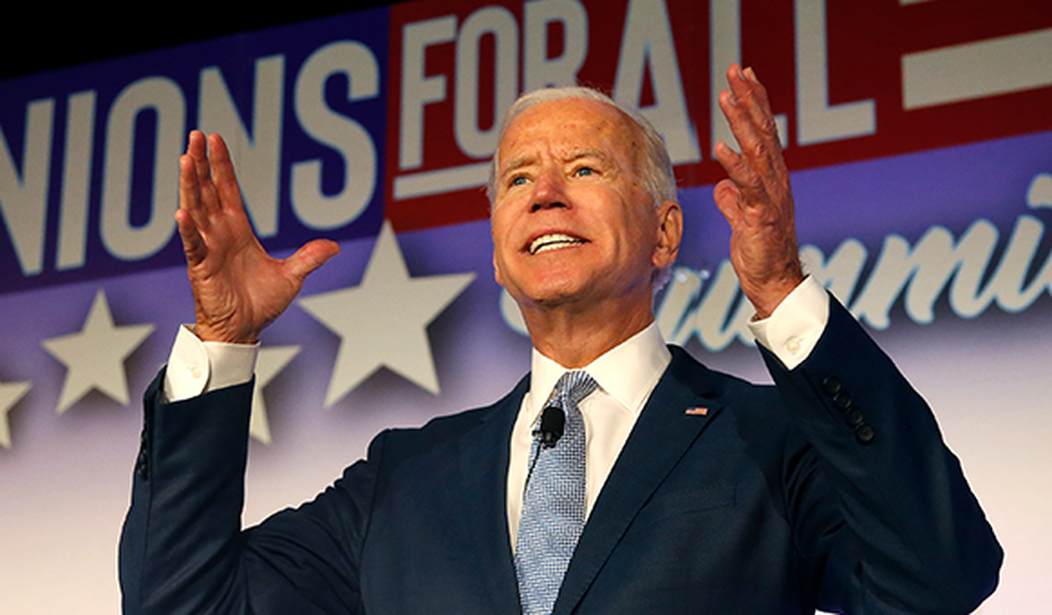Consider this an adjunct to Nancy Pelosi’s catch-22, especially in dealing with the Congressional Progressive Caucus. The union allies of Joe Biden, Chuck Schumer, and Pelosi herself have apparently caught all three attempting an end-run around their collective-bargaining authority. They now accuse Biden of talking out of both sides of his mouth — and acting a lot like Donald Trump rather than backing his “unions for all!” pledge of the campaign.
Say, where did that popcorn go?
A little-noticed provision of the $1 trillion infrastructure bill the Senate passed this week would create a new Transportation Department research agency that would operate outside the civil service system.
The move has angered the federal employee unions the Biden administration counts as powerful allies, leading to charges that the White House is embracing an approach to hiring and firing government employees put in place by President Donald Trump, who was hostile toward the federal workforce. Adding to the anger and confusion among union officials is that while President Biden moved in his first days in office to repeal a Trump-era order, known as Schedule F, that sought to remove civil service protections from a large class of federal employees, his administration now appears to be trying to use the same policy selectively.
“President Biden may have rescinded Schedule F, but the reintroduction of this governance model in an infrastructure bill is gratuitous and unnecessary . . . and represents an attack on the underpinnings of an apolitical civil service,” American Federation of Government Employees National President Everett Kelley wrote in a letter to lawmakers last week.
Pete Buttigieg championed this provision, so presumably he might need to answer to his union allies as well. The idea is smart enough, as is the decision to keep it outside the civil-service bureaucracy. The value in an ARPA-Infrastructure agency would be in its ability to innovate and think outside the box. Those are two qualities for which bureaucracies and union shops are not well known, to say the least.
In fact, that’s the entire point, as the Post points out. And it’s why the unions want to nip this in the bud before Biden uses the template elsewhere:
Biden officials intend to use the template elsewhere. They’ve proposed a similar agency at Health and Human Services called ARPA-H, which would set up an entity at the National Institutes of Health to find breakthroughs in the fight against cancer and other illnesses.
The proposed agencies at Transportation and HHS reflect growing bipartisan frustration with a sluggish federal employment process that has changed little since the 1970s and, lawmakers argue, often fails to draw the most talented people to government and makes it difficult to dismiss poor performers.
That’s not a side effect of those rules; it’s their raison d’être. Civil service rules even on their own are designed to keep marginal performers protected, and that disincentivizes better performance elsewhere, especially since the same rule system prevents much reward for excelling. Add in union protections and collective bargaining, and those bureaucracies turn into barely moving carbuncles.
What’s interesting is that this is coming up now, and in a Democratic administration. One would expect such efforts from a Republican administration, given the close political affiliations between unions (especially public-employee unions) and the Democratic Party. Having the Biden White House argue this even implicitly strengthens those arguments for Republicans — and perhaps indicates that unions are losing their grip on policy. So much for “unions for all,” in any case.
One has to wonder why this is coming out at this particular moment, though. Shouldn’t the unions have noticed this when the bill was in the Senate? It smells a bit like Pelosi’s progressives looking for predicates to torpedo the bipartisan bill and force a vote instead on only the budget resolution that will unlock reconciliation in the Senate. They might have decided that the only way to force the nine moderates back into line is to sic Big Labor on them — and who knows? It just might work.
While we pass the popcorn on that fight, we should watch for pressure against the infrastructure bill from another direction:
Crypto-friendly House Democrats are plotting a long-shot bid to scale back digital currency tax rules tucked into President Joe Biden’s infrastructure plan, threatening to prolong a lobbying battle that snarled the legislation in the Senate.
At issue in the fight are proposed requirements that would force cryptocurrency exchanges and other firms to report transaction information to the Internal Revenue Service, similar to rules in place for stock brokers. As drafted, industry lobbyists and sympathetic lawmakers say the plan threatens technological innovation and the viability of a growing sector of the U.S. economy.
Leading the charge in the House are California Democrats in the orbit of Silicon Valley, including Reps. Ro Khanna, Eric Swalwell and Anna Eshoo. They’re being joined in the fight by cryptocurrency enthusiasts such as Reps. Bill Foster (D-Ill.) and Darren Soto (D-Fla.), who have already started rallying support to amend the infrastructure bill.
The small but growing coalition, which also includes Republicans, is giving hope to lobbyists who failed to pare back the proposal in the Senate after going toe-to-toe with the legislation’s original negotiators and the White House.
Ted Cruz tried to raise these issues in the Senate, but his amendment went down to defeat in the vote-a-rama. This might not keep the House from passing the bill, but if they successfully amend these provisions, Chuck Schumer will have to try to push it through the Senate again and avoid a filibuster. Can he do it? I’d bet he’d prefer not to have to try.







Join the conversation as a VIP Member